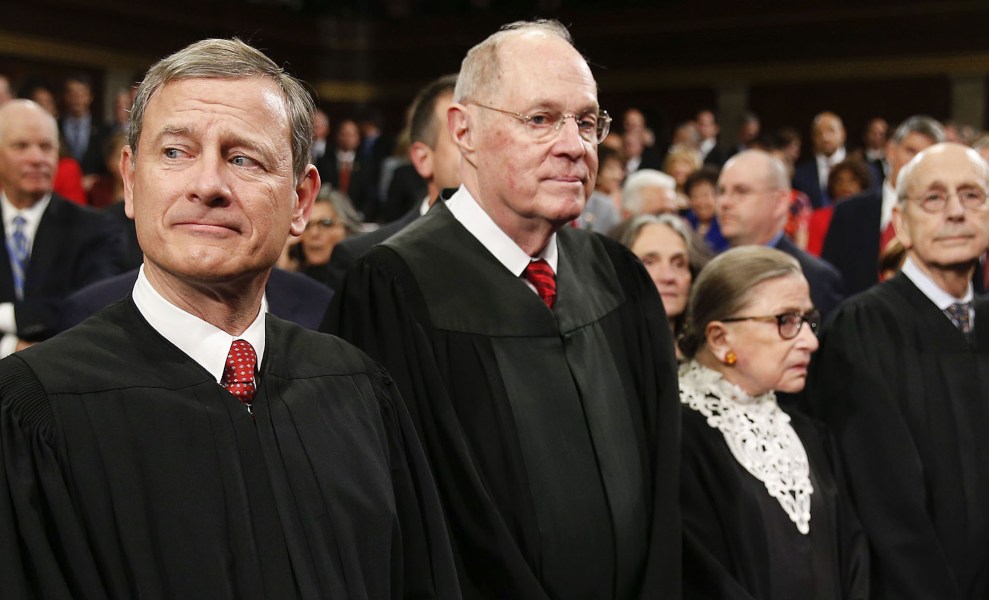
US Supreme Court Justice Samuel AlitoAP Photo/Cliff Owen
Samuel Alito knows how to play the long game. The Supreme Court justice might find himself increasingly authoring dissents for the minority side of the eight-member court, following the February death of Justice Antonin Scalia, but that doesn’t keep him from trying to move the ball on ideological issues he cares about. In his opinions, he has invited activists to bring new anti-union cases and advanced a far more radical interpretation of religious freedom than the court has ever recognized. And on Thursday, in his lengthy dissent in a major affirmative action case, he seemed to lay the groundwork to bolster two other cases making their way to the court that could prove far more threatening to the use of race in college admissions.
Thursday’s surprise ruling in Fisher v. University of Texas upheld the use of race in admissions at the University of Texas, in a case brought eight years ago by Abigail Fisher, who claimed she was shut out of the flagship state university because she was white. The court ruled in favor of the university, preserving race as what Justice Anthony Kennedy called “but a factor of a factor of a factor” in the university’s “holistic” admissions program to select worthy applicants.
Alito disagreed and issued a dissent almost three times as long as the majority opinion, in which he suggested that the court sided with the university “simply because it is tired of this case.” (Now in its eighth year, Fisher has been before the high court twice.) Reading his summary from the bench to emphasize his disapproval of the ruling, Alito accused his colleagues of allowing the university to rely on “offensive stereotypes” of minority students. He added a comment that wasn’t in his written opinion: “This is affirmative action gone berserk.”
Taking aim at the idea that simply bean-counting demographics—a few Hispanics here, a few black students there—could bring to the classroom the viewpoints of an entire race of people, he turned to a group of students largely overlooked in the litigation: Asians. Asian students, he said, might hail from any number of different countries, representing 60 percent of the world’s population. “What is an Asian viewpoint?” he asked, suggesting that it would be “ludicrous” to think that students of Asian decent all shared similar stories or uniform ways of looking at the world. He also mocked the majority’s acceptance of the university’s argument that it needed to use race in admissions to combat the “loneliness and isolation” of black and Latino students, noting that there are fewer Asians than Hispanics on campus, but they do not benefit from the school’s affirmative action program.
Alito’s repeated references to Asian students were a clear nod to two other cases working their way through federal court, although he did not mention them specifically. One case was filed against Harvard University, accusing it of imposing strict caps on the number of incoming Asian American students while giving preference to black, Hispanic, and white students who are less qualified. News coverage has referred to the Asian Harvard applicants as “the new Jews,” referring to Harvard’s discrimination against Jews decades ago. The complaint, filed in federal court in Boston in November 2014, argues that exceptionally qualified Asian students, including many with perfect SAT scores, are being shut out because Harvard wants to limit their numbers.
A similar case has been filed against the University of North Carolina, claiming that the state school is still using outdated and illegal racial preferences in admissions. Both cases were orchestrated by the same man who ginned up Fisher: Edward Blum, a Texas stockbroker who has made a career out of trying to attack race-based policies in redistricting and college admissions. (He was also behind another case before the court this term, a challenge to Texas’ method of drawing of legislative districts. The court rejected his side in that case.) Blum has created a new organization, Students for Fair Admissions, that serves as the plaintiff in both cases. The cases have been in limbo while Fisher was being decided, but now they’re likely to move forward.
New York Law School associate dean Deborah Archer calls them “sleeper cases,” because they haven’t received as much attention as Fisher even though they are much broader challenges that have a greater potential to dismantle affirmative action. The Asian students are far more compelling potential plaintiffs than Fisher ever was. Documents produced in Fisher’s lawsuit show that even if she’d been black, she wouldn’t have gotten into the University of Texas because she’d been a mediocre high school student whose grades didn’t make the cut. (Twitter users have cruelly dubbed her “#BeckyWithTheBadGrades.”) That’s not the case of the Asian students, who, according to Blum’s assertions, are extremely well qualified for the Ivy League.
Even so, it’s not clear that Asian American students are flocking to Blum to join these cases. A chronic problem for all of Blum’s cases has been finding sympathetic plaintiffs willing to fight what’s often seen as a racist battle. As I wrote earlier this year:
For now, the sole plaintiff in these cases is Students for Fair Admissions, rather than actual students. Its legal filings suggest Asian American students are not exactly lining up to join Blum’s latest cause. They cite a single, unnamed Asian American student who was denied admission to Harvard. Pages and pages of the complaint against UNC outline the university’s alleged discrimination against Asians. Yet the only student identified as having been rejected is not named as a plaintiff. He is white.
Alito’s dissent in Fisher appears designed to persuade his conservative colleagues—Kennedy in particular—that the Asian student cases are worth hearing. In a footnote, Alito elaborated on the ways that the University of Texas’ race-based policy discriminates against Asian Americans. He quoted from a brief filed by the Asian American Legal Foundation arguing that in the school’s view, with its focus on increasing the numbers of black and Latino students, “Asian Americans are not worth as much as Hispanics in promoting ‘cross-racial understanding,’ breaking down ‘racial stereotypes,’ and enabling students to ‘better understand persons of different races.'”
Alito has waged a war against race-based preferences his entire adult life. As a young lawyer, he wrote a job application letter to Reagan White House officials emphasizing his work in the Solicitor General’s office, where he “was particularly proud of my contributions in recent cases in which the government has argued in the Supreme Court that racial and ethnic quotas should not be allowed.” In the same application, Alito touted his membership in the Concerned Alumni of Princeton, which put out a magazine called Prospect that once published an article reflecting the group’s views on affirmative action:
Everywhere one turns blacks and Hispanics are demanding jobs simply because they’re black and Hispanic, the physically handicapped are trying to gain equal representation in professional sports, and homosexuals are demanding that government vouchsafe them the right to bear children.
During his Supreme Court confirmation hearings in the Senate, Alito distanced himself from the group and forcefully disavowed its views on affirmative action. But his dissent in Fisher indicates he hasn’t moved far away from those early views on the subject. His laser-like focus on boosting the prospects of the next set of challenges to college affirmative action suggests that, while his colleagues may indeed be tired of this war, Alito wants to open a new front.

















